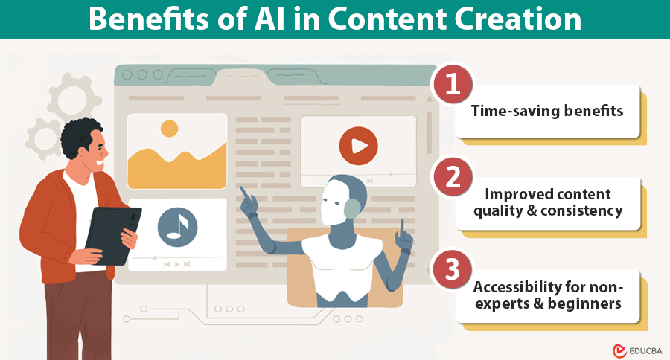Educba
4w
415

Image Credit: Educba
AI in Content Creation
- Artificial intelligence (AI) mimics human intelligence to handle tasks like problem-solving, pattern recognition, and language interpretation, aiding in content creation for non-experts.
- AI tools have transformed various sectors, from healthcare to customer service, and offer time-saving benefits, improved content quality, and accessibility for beginners.
- AI tools like writing assistants (e.g., Grammarly), content generators, design tools (e.g., Canva), and video editing tools (e.g., Magisto) empower users to create high-quality content efficiently.
- To get started with AI tools, users should identify their needs, research and compare tools, integrate them gradually, and familiarize themselves with the tools through practice and learning.
- Best practices for using AI tools include blending AI efficiency with human creativity, staying updated on tool features, and maintaining ethical standards in content creation.
- Common misconceptions about AI tools include the belief that they will replace human creators entirely, whereas they actually serve as assistants to enhance content creation.
- The future of AI in content creation includes emerging trends like natural language processing (NLP) and predictions of enhanced collaboration between humans and machines for more innovative content production.
- Staying informed about AI advancements is crucial for leveraging AI tools effectively and staying competitive in content creation, allowing non-experts to achieve professional results with ease.
- AI technology has revolutionized content creation, offering accessibility and efficiency, simplifying tasks, enhancing creativity, and ensuring consistent quality for users of all skill levels.
- Businesses can benefit from incorporating AI tools into their content strategy with the help of content specialists who can align content with brand goals and voice for professional results.
Read Full Article
25 Likes
For uninterrupted reading, download the app